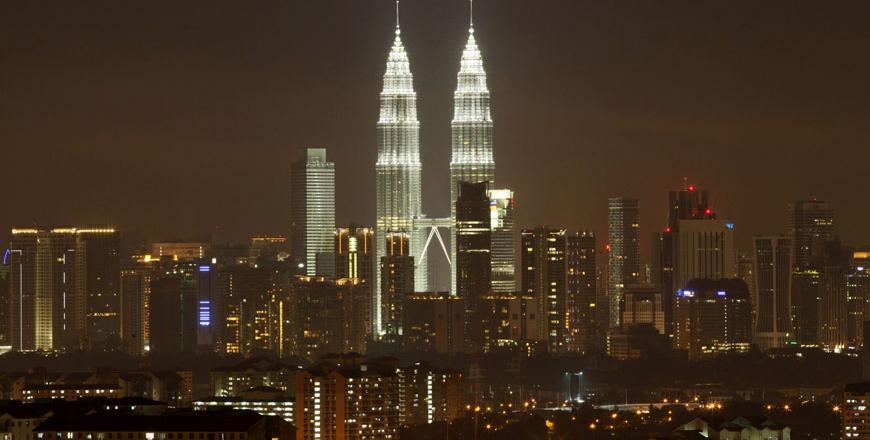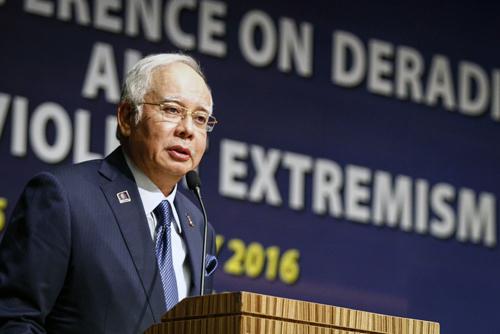You are here
Malaysia's PM presents growth strategy for next five years
By Reuters - May 21,2015 - Last updated at May 21,2015

The Petronas twin towers in Kuala Lumpur, a Malaysian landmark (Reuters file photo)
KUALA LUMPUR — Malaysia's Prime Minister Najib Razak laid out his government's growth strategy for the next five years on Thursday, mixing spending on infrastructure with populist pledges on jobs and housing as he looks to shore up support amid growing criticism.
Presenting the plan to parliament, Najib forecast gross national income (GNI) per capita would rise 7.9 per cent per annum, enough to hit the goal set two decades ago of joining the ranks of high-income nations by 2020.
Najib, who leads a government under fire over allegations of state corruption and mismanagement, indicated that Malaysia's real gross domestic product (GDP) would grow at a steady 5 to 6 per cent annually until 2020, despite the impact of falling energy prices on the oil and gas producer.
"We foresee greater volatility and uncertainty in the global economy as a result of the decline in oil prices, realignment of exchange rates, as well as geopolitical risks," Najib said in a foreword to the five-year blueprint.
"In order to sustain our growth momentum and ensure that the rakyat [people] continue to prosper, we need to forge ahead with greater resolve and introduce bold measures for the long-term benefit of all Malaysians," he added.
The target of becoming a fully developed economy by 2020 was first laid out by long-serving former prime minister Mahathir Mohamad, now a scathing critic of Najib over alleged corruption in debt-ridden state investment fund 1MDB.
The 11th Malaysian Economic Plan pledged 260 billion ringgit ($72.18 billion) to achieving its development goals over the next five years, and included promises of more jobs and affordable housing as the government seeks to rebuild popular support.
The plan comes as Malaysia navigates a tricky economic environment of slumping energy prices that threaten oil and gas revenues. The country's currency, the ringgit, has dropped to six-year lows against the dollar.
"The plan was drafted for an ideal environment," said Kenanga Investment Bank economist Wan Suhaimie Wan Saidie. "It's hard to judge if the plan would be successful after five years when anything can happen politically and economically."
Feel-good measures
In the blueprint, Najib said GNI per capita would reach 54,100 ringgit ($15,690) in 2020, just above the 2020 target of $15,000, with average monthly household income increasing to 10,540 ringgit from 6,141 ringgit in 2014.
Najib's "people-anchored growth" plan also included a slew of feel-good measures aimed to ease the burden of rising costs of living and poor infrastructure in his government's electoral heartland in rural parts of the Borneo region.
Besides promising resources to build more than 600,000 new affordable homes, the five-year plan offered more opportunities for the ethnic Malay community and other so-called Bumiputeras, or "sons of the soil", who together make up about 68 per cent of the population.
Bumiputeras have benefited from wide-ranging affirmative action privileges since the early 1970s, a policy that critics say has stunted the country's competitiveness.
Infrastructure projects outlined in the report included new power plants, the construction of airports in the Borneo state of Sarawak, a high-speed rail link with Singapore and urban light rail transit projects.
There were also promises of more schools and hospitals.
The opposition criticised the plan as being light on details and containing little new.
"The 11th Malaysian Plan is not rooted in reality, is not transparent and is far from being a game changer," said opposition lawmaker Ong Kian Ming.
An unpopular new goods and services tax (GST), introduced to help offset the shortfall from falling energy revenues, would bring in about 31.4 billion ringgit per year over the next five years, versus 15.5 billion ringgit through the previous sales tax and services tax, Najib indicated.
Malaysia's dependence on oil-related revenue would decline to 15.5 per cent of revenue by 2020, from just under 30 per cent currently, the report said.
The federal government's total debt was projected to drop to 45 per cent of GDP by 2020, from 54.5 per cent as of December 2014.
Private investment was expected to grow at an annual 9.4 per cent between 2016-2020 with an estimated annual investment of 291 billion ringgit.
Public investment would grow at 2.7 per cent per annum at an annual average of 131 billion ringgit, the plan stated.
Financial markets showed little reaction to the announcement of the five-year plan, with the benchmark share index dipping around 0.4 per cent.
Related Articles
KUALA LUMPUR — Malaysian Prime Minister Najib Razak said on Thursday he would not peg the ringgit to the US dollar or implement capital cont
KUALA LUMPUR — Malaysia's attorney-general cleared Prime Minister Najib Razak of any criminal offences or corruption on Tuesday, closing inv
AMMAN — Jordan and Malaysia's trade, education and tourism ties "still hold untapped potential" for both countries, highlighted Malaysia’s A














